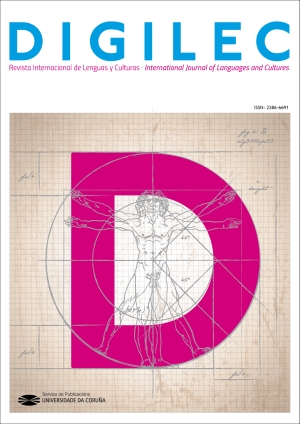Explorando la frontera ética: la educación en línea en la era de los avances tecnológicos
Contenido principal del artículo
DOI:
https://doi.org/10.17979/digilec.2024.11.10745Resumen
La evolución del sector educativo, profundamente influida por el progreso tecnológico, ha dado paso a una nueva era de aprendizaje en línea, que merece una amplia exploración académica. Este documento adopta un enfoque de investigación narrativa para diseccionar la matizada relación entre la innovación tecnológica y las consideraciones éticas dentro de los marcos educativos en línea. Examina meticulosamente las experiencias de los educadores que están a la vanguardia de esta revolución digital, prestando especial atención a los dilemas éticos y las adaptaciones a las que se enfrentan en este panorama educativo moderno. El método de investigación consiste en entrevistas semiestructuradas, que facilitan una comprensión profunda y matizada de los polifacéticos retos y perspectivas que plantean los avances tecnológicos en la educación (Clandinin & Connelly, 1990; Riessman, 2008). Los resultados de este estudio ponen de manifiesto el continuo y complejo proceso de negociación al que se someten los educadores para adaptar su conducta profesional y sus normas éticas a las exigencias siempre cambiantes de los avances tecnológicos en la educación. Esta negociación es crucial para configurar su identidad y su práctica en el ámbito digital. El estudio no sólo arroja luz sobre la interacción dinámica entre la tecnología y la ética en la educación en línea, sino que también contribuye al discurso académico más amplio sobre el tema. Hace hincapié en la urgente necesidad de una mayor conciencia ética e integridad a la hora de navegar por el panorama educativo digital, subrayando la importancia de estos valores para garantizar un entorno educativo responsable y equitativo en la era de la tecnología.
Palabras clave:
Detalles del artículo
Referencias
Ariav, Z. (2006). Teacher Professional Development: Research Findings and Conclusions. National Teachers Conference for Computer Science and Information Technology Teachers. Beit Berl College.
Barak, M., Ben-Chaim, D., & Zoller, U. (2007). Purposely teaching for the promotion of higher order thinking skills: A case of critical thinking. Research in Science Education, 37(4), 353-369. https://link.springer.com/article/10.1007/s11165-006-9029-2
Boyd, D. (2014). It's Complicated: The Social Lives of Networked Teens. Yale University Press.
Clandinin, D. J., & Connelly, F. M. (1990). Narrative Inquiry: Experience and Story in Qualitative Research. Jossey-Bass.
Daynes, S., & Pinnegar, S. (2007). Educational Research in the Narrative Mode. Harvard Educational Review.
Ertmer, P. A., & Ottenbreit-Leftwich, A. (2006). Exemplary technology-using teachers: Perceptions of factors influencing success. Journal of Computing in Teacher Education, 23(2), 55–61.
Fetterman, D. (2010). Ethnography: Step-by-Step (3rd Ed.). Sage Publications.
Fulton, K., & Torney-Purta, J. (2000). How teachers’ beliefs about teaching and learning are reflected in their use of technology: Case studies from urban middle schools. International Conference on Learning with Technology.
Geertz, C. (2008). The Interpretation of Cultures: Selected Essays. Basic Books.
Levin, T., & Wadmany, R. (2008). Teachers' views on factors affecting effective integration of information technology in the classroom. Journal of Technology and Teacher Education, 16, 233-263.
Maner, W. (1996). Unique ethical problems in information technology. Science and Engineering Ethics, 2(2), 137-154. https://link.springer.com/article/10.1007/bf02583549
Mioduser, D., Nachmias, R., Tobin, D., & Forkosh, A. (2006). Pedagogical innovation integrated with information and communication technologies. Tel Aviv University.
Nussbaum, M. C. (2016). Not for Profit: Why Democracy Needs the Humanities. Princeton University Press.
Papert, S. (1993). Mindstorms: Children, Computers, and Powerful Ideas. Basic Books.
Riessman, C. K. (2008). Narrative Methods for the Human Sciences. Sage Publications.
Selwyn, N. (2014). Digital Technology and the Contemporary University: Degrees of Digitization. Academic Press.
Shlesky, P., & Alpert, B. (2007). Narrative Research in Practice: Stories from the Field. SAGE.
Shulman, L. S. (1986). Those who understand: Knowledge growth in teaching. Educational Researcher, 15(2), 4–14. American Educational Research Association.
Tavani, H. T. (2011). Ethics and technology: Controversies, questions, and strategies for ethical computing (3rd ed.). John Wiley & Sons.
Tzabar - Ben Yehoshua, N., & Dargish, T. (2001). Qualitative Research in Education: Contexts and Processes. Dvir.
Warschauer, M. (2003). Technology and Social Inclusion: Rethinking the Digital Divide. MIT Press.


